Sports
/ArcaMax
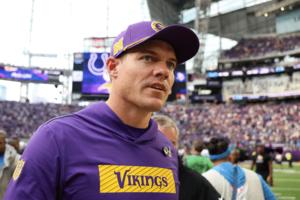
Jim Souhan: Late-season collapse didn't damage Kevin O'Connell's credibility
MINNEAPOLIS — An investor named Bill Hwang once lost $20 billion in two days.
Almost as much as Sam Darnold lost in the last week.
American historians called the economic disaster beginning in 1929 “The Great Depression.”
That’s because they never sat amid Vikings fans at 5 a.m. at Sky Harbor Airport in Phoenix after Darnold scuttled ...Read more
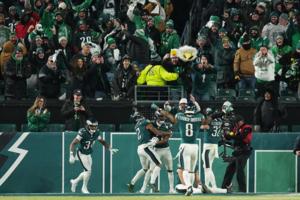
Eagles ban the fan caught on camera berating a Packers supporter
PHILADELPHIA — Lincoln Financial Field is known for being an intense environment to play in. But at Sunday’s Eagles-Packers game, a man was caught on camera taking that too far.
Packers fan Alex Basara of Chester County (Pa.) posted a video of an Eagles fan using language that is not fit to print berating his fiancée in the upper deck of ...Read more
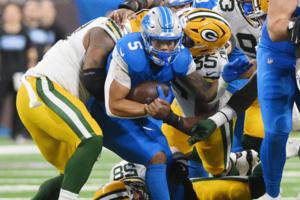
Lions running back David Montgomery on track to return vs. Commanders: 'I'm confident'
DETROIT — The Detroit Lions will welcome back an important member of their offense at practice this week.
Running back David Montgomery (knee) and cornerback Terrion Arnold (foot) were listed as full participants on Tuesday's practice report. The team held a walkthrough to begin the week of preparation for Saturday night's prime-time meeting ...Read more
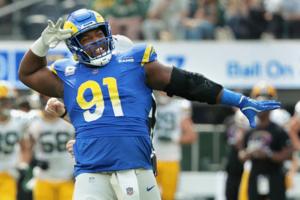
NFL playoffs: Divisional round features intriguing rematches
LOS ANGELES — Kobie Turner calls them "get-back" games.
The Rams' defensive end is talking about redemption, not regression. He doesn't want to get back to where the team was when it lost by 17 to the Philadelphia Eagles in Week 12. He wants to get back at the Eagles for one that got away.
"We were able to get our get-back on Arizona when ...Read more

Troy Renck: Broncos will only go as far as Bo Nix takes them. That means they should be a Super Bowl contender next season.
DENVER — Coach Sean Payton raged at Vance Joseph on the sideline in Buffalo.
But even after the Bills stampeded the Broncos in the second half of a 31-7 loss at Highmark Stadium on Sunday, the 35,000-foot view still tells us the defense is not Denver’s problem.
If the Broncos are going to take the next step in the AFC, they will go only as...Read more
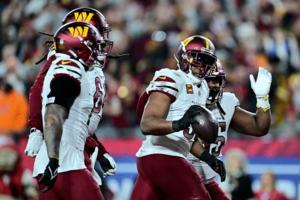
Matt Calkins: Seahawks fans don't need to sit out playoffs. Here's your rooting interest.
SEATTLE — With the Seahawks not sniffing the postseason, it's fair to ask who Washington's football team is right now.
And the answer is simple: Washington.
No, not those Dawgs donning purple and gold. It's those Commanders in our nation's capital.
It's understandable if folks in our state want to sit out the NFL playoffs because of the ...Read more
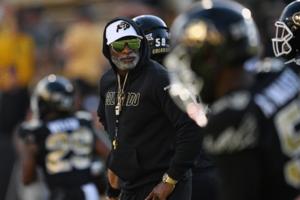
Mac Engel: The real reason why Jerry Jones called Deion Sanders about the Cowboys coaching job
FORT WORTH, Texas — Jerry Jones calling Deion Sanders to gather his thoughts about becoming the head coach of the Dallas Cowboys is why JJ is a member of the Pro Football Hall of Fame.
News of the phone call generated the attention that PT Jerry craves. The call checked a critical box off the list in the immediate stages of a coaching search ...Read more
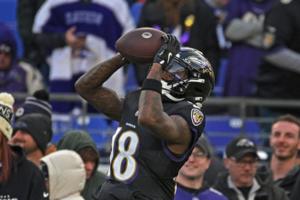
Texans waive WR Diontae Johnson, reportedly because of same issues he had with Ravens
BALTIMORE — Diontae Johnson told local reporters in December the issues that plagued his short stint in Baltimore would be left in the past and his new chapter in Houston would be a fresh start.
That didn’t last long.
Johnson, 28, was reportedly placed on waivers ahead of Houston’s AFC divisional round matchup with the Kansas City Chiefs...Read more
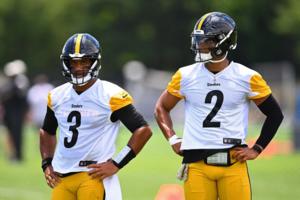
Mike Tomlin undecided on Steelers starting QB for 2025 season
PITTSBURGH — In his final news conference of the season, Mike Tomlin was noncommittal about who will be playing quarterback for the Steelers next season.
All three quarterbacks on the 53-man roster, including starter Russell Wilson, are not under contract for the 2025 season. Tomlin did not endorse Wilson nor backup Justin Fields for the job ...Read more
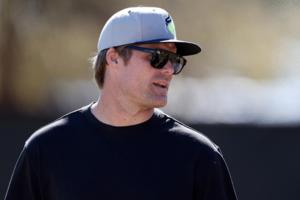
Scott Fowler: Missing Greg Olsen: How is it that TV's best broadcaster has been benched for NFL playoffs?
CHARLOTTE, N.C. — There’s not a lot of Carolina Panther representation left in these NFL playoffs.
The Panthers, themselves, of course, missed the postseason for the seventh year in a row. In the just-concluded first round of the playoffs, the two most high-profile former Panthers both lost — Minnesota quarterback Sam Darnold and Tampa ...Read more
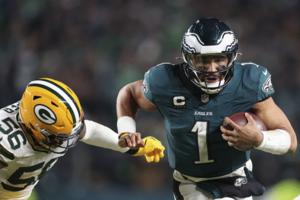
David Murphy: The 7 seconds that showed why the Eagles are a strong bet for the Super Bowl
PHILADELPHIA — Eat a Tastykake.
Whistle the opening bars of “Gonna Fly Now.”
Ride a unicycle in two complete circles.
These are some of the things that Jalen Hurts had enough time and space to do before throwing an 11-yard touchdown pass to Jahan Dotson a minute and a half into the Eagles’ 22-10 wild-card win over the Green Bay ...Read more
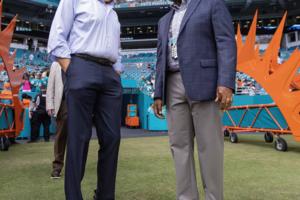
Omar Kelly: Dolphins better be prepared to pay hidden cost of keeping Grier and McDaniel
MIAMI — As a developer and CEO of one of America’s biggest real estate companies Steve Ross should be knowledgeable about hidden costs.
Hopefully the Miami Dolphins owner is accounting for the hidden cost of keeping things status quo with South Florida’s NFL franchise.
While general manager Chris Grier and head coach Mike McDaniel each ...Read more
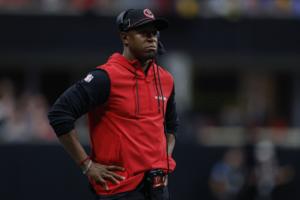
Ken Sugiura: Falcons' Raheem Morris has to learn from his mistake of hiring Jimmy Lake
ATLANTA — Falcons coach Raheem Morris has a second chance to get his defensive coordinator hire right. He needs to go after someone with more job-specific experience than his first hire had.
Which is to say, anyone who has held an NFL defensive coordinator job for at least one day.
Morris gambled by hiring Jimmy Lake to run his defense. Lake...Read more
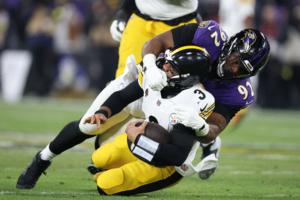
Paul Zeise: Steelers need to stop dying and get busy living
PITTSBURGH — One of the most quoted lines from the classic movie "The Shawshank Redemption" is when Morgan Freeman's character is pondering what life after a long incarceration looks like and he says, "Get busy living or get busy dying."
In this context, Freeman's character had the choice to either stay stuck in a mundane life at a dead-end ...Read more
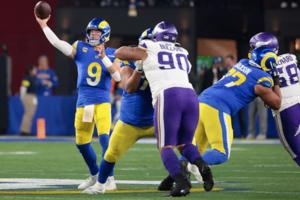
Dominant Rams makes themselves at home in Arizona with rout of Vikings
GLENDALE, Ariz. — Now that’s what you call making yourself right at home, even if it was nearly 400 miles away.
Because of safety concerns caused by wildfires in Southern California, the NFL moved the Rams’ NFC wild-card game against the Minnesota Vikings from SoFi Stadium to State Farm Stadium.
But the Rams — on a mission to win and ...Read more
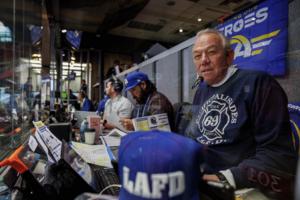
Rams' PA announcer loses house but keeps voicing optimism at relocated playoff game
GLENDALE, Ariz. — In re-creating their home environment for Monday night’s playoff game, the Los Angeles Rams made sure to bring a signature element from SoFi Stadium.
The voice.
If you’ve been to a Rams home game, you likely know Sam Lagana. He’s the in-stadium announcer who fires up the crowd by bellowing, “Whose house?” ...Read more
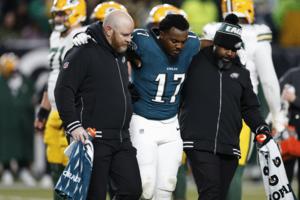
Nakobe Dean suffers season-ending knee injury in Eagles' wild-card win vs. Packers
PHILADELPHIA — As the Eagles move on to the divisional round of the playoffs, Nakobe Dean is out for the rest of the postseason.
The 24-year-old inside linebacker suffered a torn patellar tendon in his left knee in the Eagles’ wild-card win over the Green Bay Packers on Sunday, a league source confirmed to The Philadelphia Inquirer. The NFL...Read more
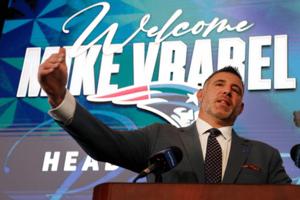
How Mike Vrabel plans to fix Patriots' offense, develop Drake Maye
FOXBOROUGH, Mass. — Offensive line has been one of the New England Patriots’ biggest problem areas for the last several seasons. Repairing it will be a top priority for new head coach Mike Vrabel.
Asked Monday about additions he’d like to make to New England’s roster, Vrabel immediately pointed to the team’s deficiencies up front. It ...Read more
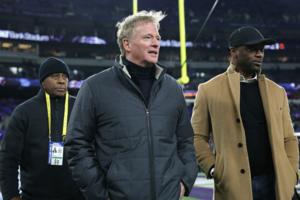
How the NFL and Rams worked together to relocate playoff game amid an LA tragedy
LOS ANGELES — The NFL will break new ground Monday, a heart-wrenching kind of history the league never wanted to make.
The first-round playoff game between the Rams and Minnesota Vikings, originally planned for SoFi Stadium, has been relocated to Arizona because of the Los Angeles wildfires. It marks the first time a natural disaster has ...Read more
Broncos QB Bo Nix had three fractures in his back during November win at Las Vegas
DENVER — Bo Nix didn’t just play in every game his rookie season.
He played through injury, too.
The Denver quarterback sustained three transverse process fractures in his back during Denver’s Nov. 24 win at Las Vegas, he said Monday after the Broncos’ season ended.
Nix said he got “twisted up” during the game against Las Vegas ...Read more
Popular Stories
- A.J. Brown's sideline book hits No. 1 and gets some funny reviews from Eagles fans
- Mike Tomlin undecided on Steelers starting QB for 2025 season
- Paul Zeise: Steelers need to stop dying and get busy living
- How Mike Vrabel plans to fix Patriots' offense, develop Drake Maye
- Ken Sugiura: Falcons' Raheem Morris has to learn from his mistake of hiring Jimmy Lake





